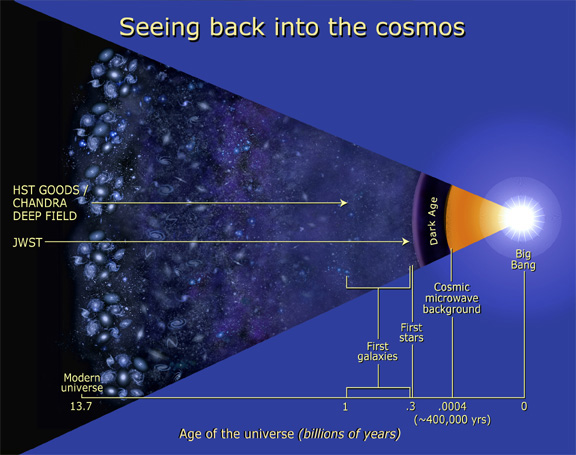RJMacready73
Simps for Amouranth
Someone explain to this dude the theory of relativity, we ain't going nowhereIf this thing sees another planet in another solar system, with liquid oceans, oxygen, ect, we are going there. They'll figure it out.
Someone explain to this dude the theory of relativity, we ain't going nowhereIf this thing sees another planet in another solar system, with liquid oceans, oxygen, ect, we are going there. They'll figure it out.
Someone explain to this dude the theory of relativity, we ain't going nowhere
If this thing sees another planet in another solar system, with liquid oceans, oxygen, ect, we are going there. They'll figure it out.
lol, no.I cant remember what star it is but i hope they take a look at that star that some scientists think a Dyson Sphere is literally being built around it.
Then again would they even tell us if they did find something?.
how much longer?
hubble has been going for 31 years and could last another 10-20 years. or maybe JWST is gonna now be able to do 30-40 years more? (doubt).
i know JWST is further away and is pretty much impossible for humans to service it. we need to work on a way to extend its life or are we gonna just start work on a new telescope?
By the time it needs to be serviced, we'll have figured something out. We're good at figuring stuff out on a long time scale.
If this thing sees another planet in another solar system, with liquid oceans, oxygen, ect, we are going there. They'll figure it out.
Another way to think of it is merely sending a message. If we could send a message at the speed of light in space (somehow preventing it getting interfered with), it would take 1,402 years to get there. And that's just a simple message.Not in our lifetimes.
A strong candidate for a Earth-like planet is Kepler-452b. The planet is in it's star's habitable zone and could be a home to life.
However, the planet is 1,402 light years from Earth. That means if you were traveling at the speed of light, it would take you 1,402 years to get there from earth. We don't have anything that can travel even close to the speed of light, so traveling to this planet is currently impossible within a human lifetime.
To give you a scale of the distance we're talking here, the New Horizon probe is traveling at 36,000 miles per hour. An insane speed indeed, but even at this speed it would take New Horizons 26 million years to reach Kepler-452b!
The only way it would be possible is if we develop a warp drive. This is currently isn't possible as the technology doesn't exist and involves using exotic matter and negative energy. If it did exist, you could expect the travel time to be maybe a few years. I haven't taken time dilation into account either, which would be another issue all together.
The only way we'd see this technology in our lifetimes is if the whole world joined forces and resources into developing such a technology. With combined funds and resources from the richest nations on Earth, I think we'd crack this in a few decades at least. However, we're still a tribal species that distrust each other. We spend more on developing ways to defend ourselves from other humans than actually spending money on ways that can improve humanity, so unfortunately I doubt we'll ever see a warp drive anytime soon.

How do you propose we cross even 4 light years distance within a single human lifetime. We will get to other star systems but we will be sending advanced robots to explore these places and even that will be a huge challenge.If this thing sees another planet in another solar system, with liquid oceans, oxygen, ect, we are going there. They'll figure it out.
Shown during the broadcast :
The spectroscopy one is insane
Goddamn I love engineering marvels. We're about to be loaded with so many new answers as well as questions from new observations of the universe like never before in history. FUCK YEA!
How do you propose we cross even 4 light years distance within a single human lifetime. We will get to other star systems but we will be sending advanced robots to explore these places and even that will be a huge challenge.
Voyager 1 travelling at a crazy 10 miles per second will still take 70 000 years to reach our nearest star Alpha Centauri which is 4 something light years away.
Are we going to get closer, clearer shots with this thing?
I get it's a lot stronger than Hubble but at the end of the day are we just going to get more of the same in a sense, visually. But instead of seeing a whole galaxy maybe we'll see a star and planets?
So exciting to think about.

What are the main science goals of Webb?
Webb has four mission science goals:
- Search for the first galaxies or luminous objects that formed after the Big Bang.
- Determine how galaxies evolved from their formation until the present.
- Observe the formation of stars from the first stages to the formation of planetary systems.
- Measure the physical and chemical properties of planetary systems and investigate the potential for life in those systems.
Are we going to get closer, clearer shots with this thing?
I get it's a lot stronger than Hubble but at the end of the day are we just going to get more of the same in a sense, visually. But instead of seeing a whole galaxy maybe we'll see a star and planets?
So exciting to think about.

Awsome, thanks!Webb will primarily be looking in the infrared. Here are the main objectives of the mission:

Webb FAQs - NASA Science
The James Webb Space Telescope, also called Webb or JWST, is a large, space-based observatory, optimized for infrared wavelengths, which complements andjwst.nasa.gov

We'll literally be able to see the formation of the first stars and galaxies after the big bang, we're talking from 100 to 300 million years after the creation. HST (Hubble) did a good job, but we're way beyond it with the JWST.
It's also a telescope that focus on infrared, which will give us more details inside nebulas for example. It'll give use a different shot than Hubble that's for sure as they focus on different wavelengths, but it'll see light sources 100 times fainter than Hubble (thus also being able to look deep in the past of the universe)
Awsome, thanks!
I've never seen this image before. Interesting. Part of me hopes they got it all wrong and are just blown away, baffled by what we're going to see.
Don't think I've ever read anything about a cosmic "dark age" either. Cool
Absent any radical advancements in physics and technology, it will be very hard to actually "see" the big bang that close and extrapolate past the planck time.I wonder if this telescope could see the big bang, somehow. Or whatever started the universe.
Also, heres a crazy idea, isn't hubble capable of seeing webb in its final position? Since they couldn't mount cameras on webb, would it possible to see it with hubble and have visual confirmation of its deployment?
Yep.
We'll literally be able to see the formation of the first stars and galaxies after the big bang, we're talking from 100 to 300 million years after the creation. HST (Hubble) did a good job, but we're way beyond it with the JWST.
It's also a telescope that focus on infrared, which will give us more details inside nebulas for example. It'll give use a different shot than Hubble that's for sure as they focus on different wavelengths, but it'll see light sources 100 times fainter than Hubble (thus also being able to look deep in the past of the universe)
The amount of people that can't grasp the concept of light years is astounding.
It's why something like James Webb is so important for knowledge, and also why dreams of space travel is for idiots.

Absent any radical advancements in physics and technology, it will be very hard to actually "see" the big bang that close and extrapolate past the planck time.
We don't even know if there's anything that "started" the universe. That implies that there was something "before" the universe, but "before" is a construct of time, and time doesn't exist "before" the universe exists.


Arrogant morons who think they're superior just because they understand basic things like that are also part of the problem. Share knowledge and educateThe amount of people that can't grasp the concept of light years is astounding.
It's why something like James Webb is so important for knowledge, and also why dreams of space travel is for idiots.
did we see them aliens yet?
We did. There's one crawling out of your toilet right now, Kev. RUN BITCH! RUN!

Then simply explain it in laymen's terms for those people Mr big brainsThe amount of people that can't grasp the concept of light years is astounding.
It's why something like James Webb is so important for knowledge, and also why dreams of space travel is for idiots.
Arrogant morons who think they're superior just because they understand basic things like that are also part of the problem. Share knowledge and educate
Then simply explain it in laymen's terms for those people Mr big brains
Then simply explain it in laymen's terms for those people Mr big brains
We will all be living in the Matrix before something man made has covered 1/100 of a light year, how about that.
No need to explain it to me, I read stuffThe distance between star systems is too far for our limited technology.
1 light year is equal to around six trillion miles. That's just 1 light year.
It would take millions of years with our current tech to travel to other star systems.
No need to explain it to me, I read stuff
How do you entangle 2 particles accross the universe, Einstein?Or maybe transfer your consciousness to the other side of the universe through quantum entanglement.

How do you entangle 2 particles accross the universe, Einstein?
Entanglement occurs through particle interaction and not somehow magically on demand across the universe.
How do you entangle 2 particles accross the universe, Einstein?
Entanglement occurs through particle interaction and not somehow magically on demand across the universe.

The amount of people that can't grasp the concept of light years is astounding.
It's why something like James Webb is so important for knowledge, and also why dreams of space travel is for idiots.

For what it's worth, in Star Trek in order to get ftl to work, they had to build giant time machines. Warp Cores work by moving through timeThe only really conceivable way to travel any kind of distance across the universe will have to come from some kind of technology that can punch a hole in spacetime. The Einstein-Rosen bridge allows for such a thing to be possible in theory. General Relativity certainly seems to be far happier with the notion of wormholes than it does faster than light travel - which is deemed impossible.
So, Dune =
Star Trek =
